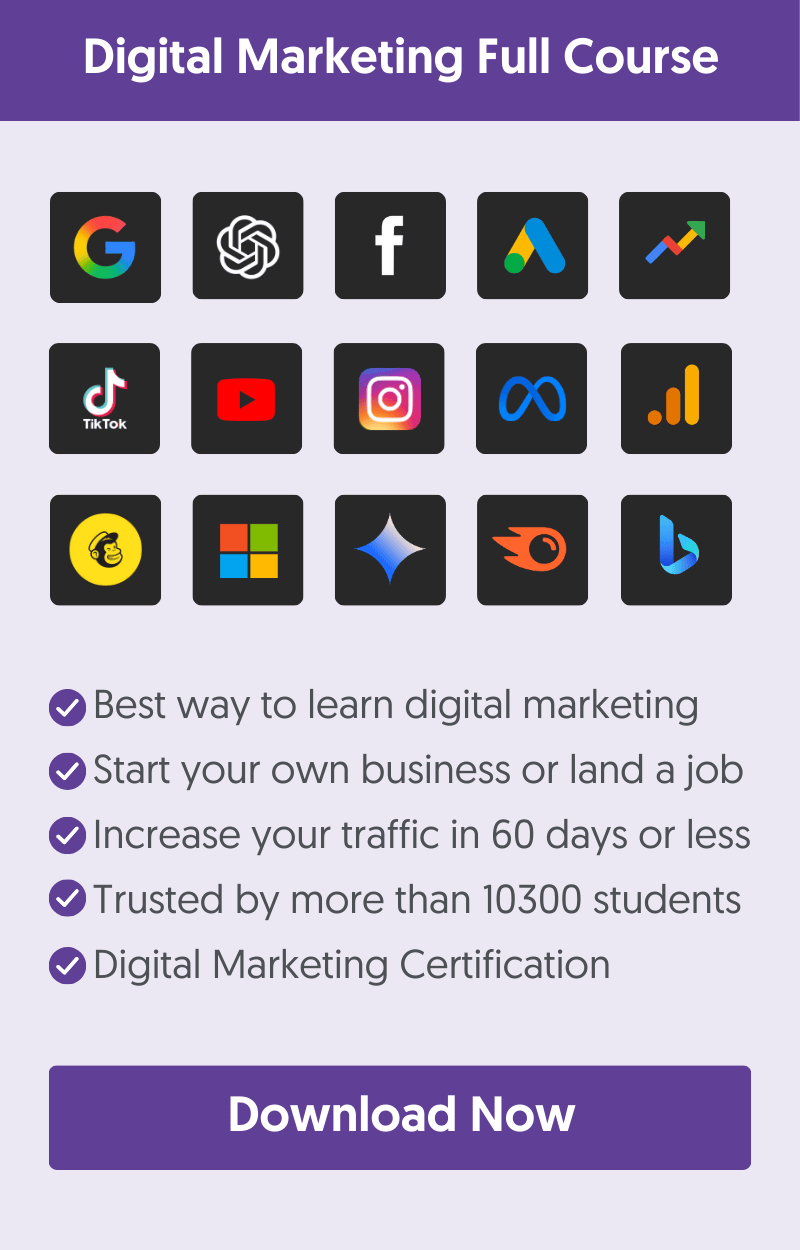Digital marketing is one of the most valuable skills you can learn today, whether you want to grow a business, start a new career, or work as a freelancer. But with so many platforms, tools, and strategies out there, knowing where to start can feel overwhelming.
In this guide, I’ll show you a step-by-step path to learn digital marketing effectively, free, and from the comfort of your home.
What is Digital Marketing?
Digital marketing is the process of promoting and selling products or services on the Internet using one or more marketing channels like search engines, social media platforms, and PPC advertising.
With digital marketing, you can find audiences interested in your brand, interact with them, and nurture them until they become customers.
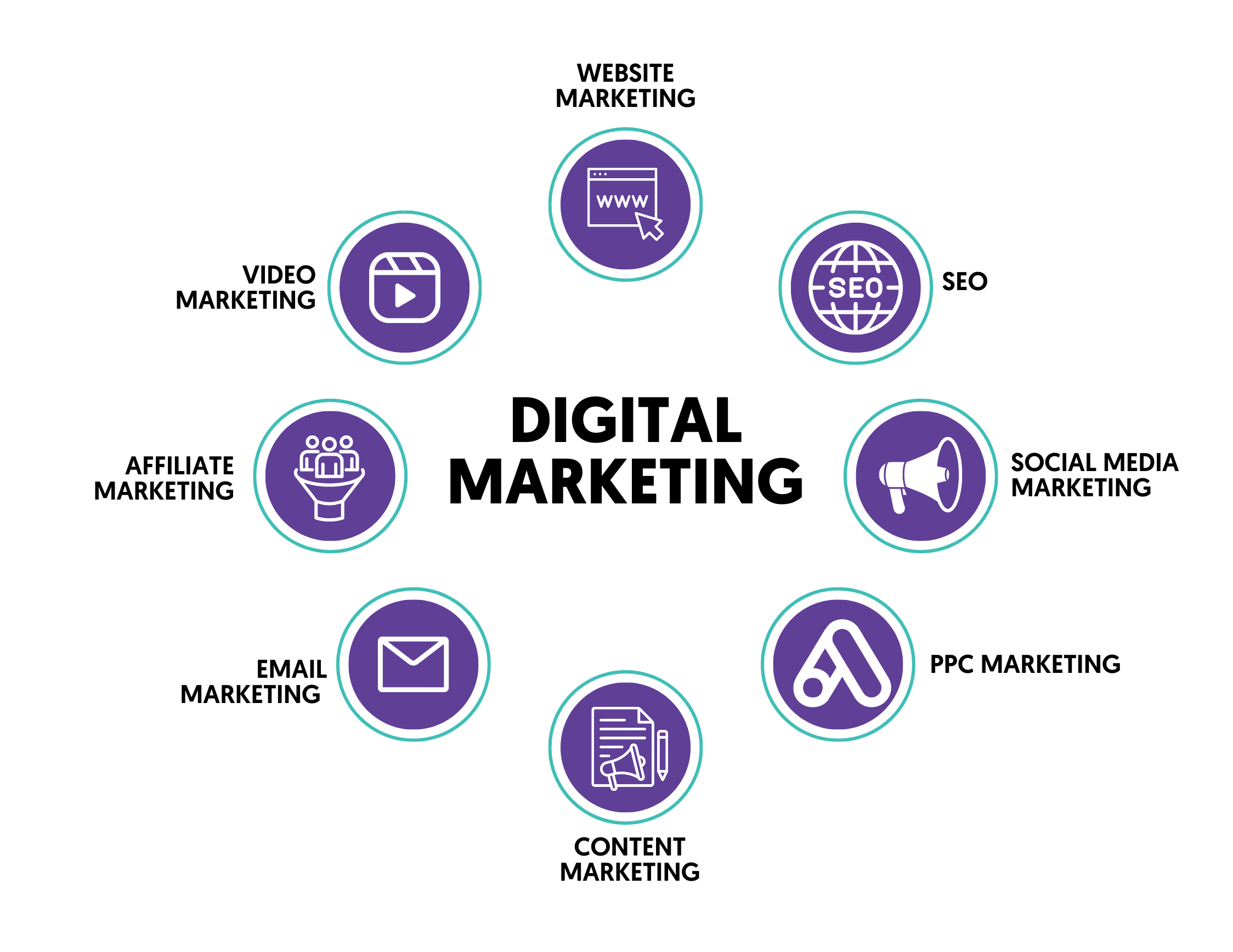
How to Learn Digital Marketing
The best way to learn digital marketing effectively is to combine structured online courses with hands-on practice, real-world projects, and ongoing skill development.
Here are the steps to follow to teach yourself digital marketing.
- Step 1: Build Foundational Knowledge
- Step 2: Take an Online Course
- Step 3: Develop Specialized Skills
- Step 4: Gain Practical Experience
- Step 5: Stay Updated and Network
- Step 6: Learn to Use Digital Marketing Tools and AI
Step 1: Build Foundational Knowledge
The first step is to build basic digital marketing skills by familiarizing yourself with the different digital marketing types.
The most important are search engine optimization (SEO), content marketing, PPC advertising, social media marketing, affiliate marketing, video marketing, website marketing, and email marketing.
These marketing channels work together under a digital marketing strategy, a plan that aligns your marketing and business goals.
For example, if a small business wants more online sales, its strategy might combine SEO to bring in organic traffic, Google Ads to get immediate clicks, and email to follow up with visitors who didn’t convert.
To start building this foundation, I recommend doing two things:
- Read beginner-friendly guides from trusted sources. Some examples include Digital Marketing Guide For Beginners by Reliablesoft and the Fundamentals of Digital Marketing by Google Skillshop.
- Watch this YouTube video that explains digital marketing in simple terms.
Step 2: Take an Online Course
Once you understand the fundamentals, the next step is to take an online course. A good course gives you structure, step-by-step instruction, and practical knowledge.
You’re not just watching random YouTube videos or reading articles from Google or ChatGPT; you’re following a clear learning path created by experts.
Here are a few great options I recommend:
The Complete Digital Marketing Course by Reliablesoft: This comprehensive course covers all important marketing channels, including SEO, content marketing, social media, AI, and paid ads.
It’s taught by experienced marketers and includes a certification at the end. Industry experts named it the 'Gold Standard for Digital Marketing Education'.
Google Digital Marketing & E-commerce Professional Certificate: It covers SEO, SEM, email, analytics, and e-commerce basics. Plus, it’s taught by Google and recognized by employers.
For more options, check these detailed lists:
Here is my advice: choose one course and commit to finishing it. Focus on learning and testing the different techniques on your campaigns.
Step 3: Develop Specialized Skills
Once you’ve gained a solid foundation of digital marketing, it’s time to start specializing. Once you become an expert in one area, you can expand your skills further.
This approach helps you build real, job-ready expertise and gives you a competitive edge in the industry.
Start with the marketing channels that align with your strengths or interests, and go from there.
Search Engine Marketing (SEO & PPC)
Search Engine Marketing (SEM) is one of the most in-demand skills in digital marketing. It includes both Search Engine Optimization (SEO) and Pay-Per-Click Advertising (PPC).
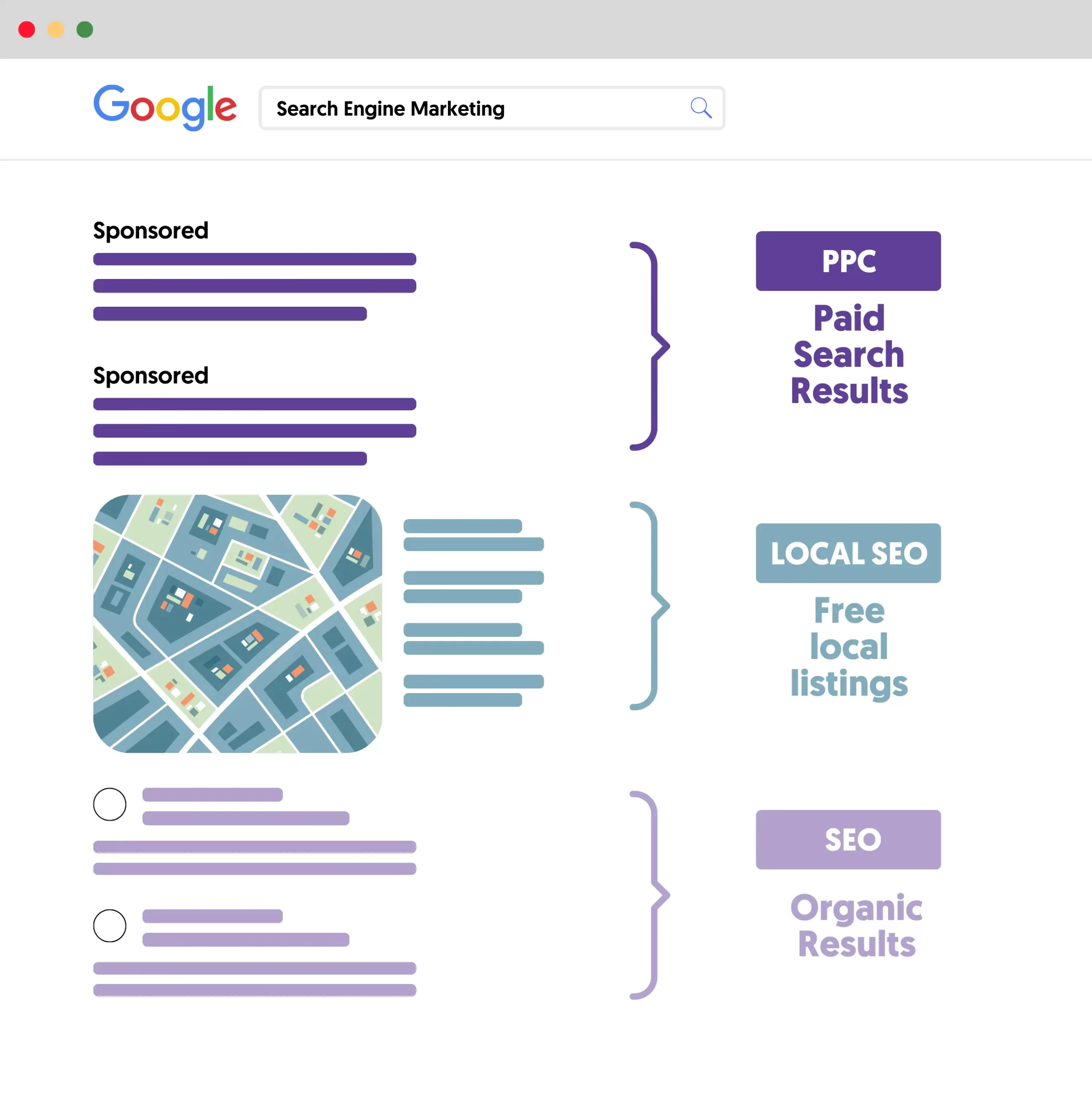
SEO focuses on getting free traffic from search engines like Google. You do this by optimizing your website and content to appear at the top of search results.
SEO is a long-term process that requires patience and continuous learning because search engines constantly change their algorithms.
To become good at SEO, you need to understand how search engines work, how Google ranks pages, and how to create content that matches users' search intent.
You’ll also learn about technical SEO (crawling and indexing), on-page SEO (optimizing content), and off-page SEO (website promotion).

PPC, on the other hand, is all about getting fast results through paid ads. Platforms like Google Ads and Bing Ads allow you to target specific keywords and show ads to users actively searching for solutions.
You’ll learn how to create ads, choose the right keywords, set bids, and track conversions. While it’s easier to start seeing results with PPC, it also requires careful budget management and regular optimization.
Learning PPC is not difficult. You can go through various online courses and become a PPC Certified expert in a few months.
Content Marketing

Every digital marketing campaign is based on content. Whether it’s SEO, social media marketing, or email marketing, you need content to reach and engage your target audience through different channels.
Content marketing is the process of identifying, creating, and promoting the right type of content to the right audience.
To become a good content marketer, you must have excellent writing, SEO copywriting, and analytical skills.
Learning content marketing is an ongoing process and requires a lot of practice. Creating content, whether it's text or video, is an art that can be mastered with practice and trial and error.
Social Media Marketing

Social media marketing is ideal for those who love to connect with people and follow trends. This specialization focuses on growing a brand’s presence on platforms like Facebook, Instagram, LinkedIn, X, and TikTok.
You’ll learn how to create engaging posts, build communities, manage content calendars, and run paid campaigns to reach specific audiences. You’ll also need to analyze data and learn what types of content perform best on each platform.
A great place to start learning social media marketing is to learn how Facebook Ads work. Facebook Ads Courses will teach you everything you need about Facebook Paid Campaigns.
Email Marketing
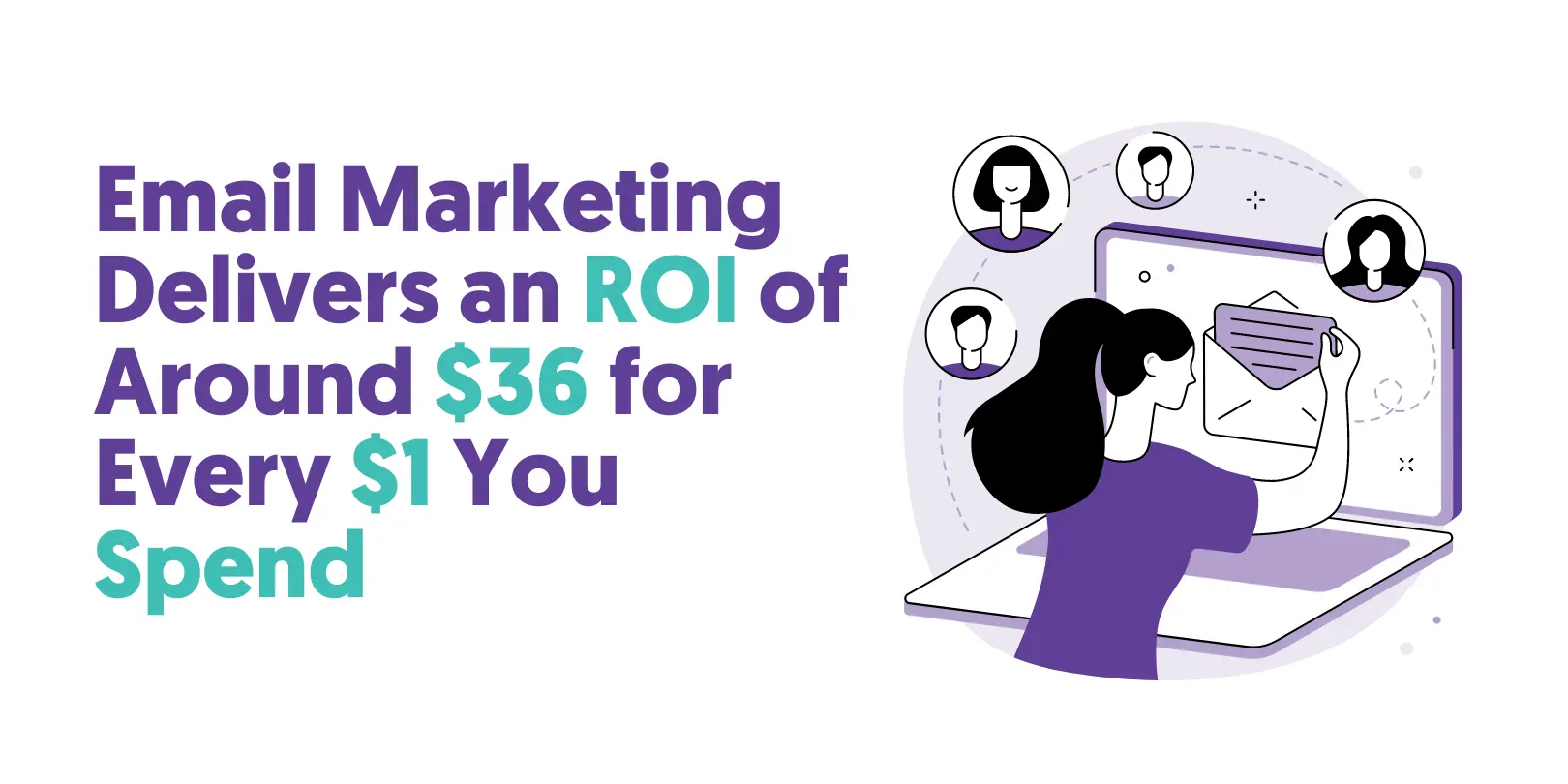
Email marketing is not dead. Despite what you might think, email is still one of the most effective ways to turn visitors into customers and existing customers into repeat customers.
To run successful email marketing campaigns, you must first know your audience. Otherwise, your emails will end up in your users' spam folders.
You can think of email marketing as the last piece of the digital marketing puzzle. While all other marketing techniques concentrate on finding new customers, email marketing is about closing the deal.
To get started with email marketing, you should build the following skills:
- Learn how email marketing automation works
- Understand how digital sales funnels work
- Get practical experience with email marketing tools
- Learn how to build an email list
- Understand the factors affecting email deliverability
Affiliate Marketing
Affiliate Marketing is one of the oldest forms of marketing, where you make a commission by selling other company's products. It's a popular method marketers use to make money online and can be used in two ways.
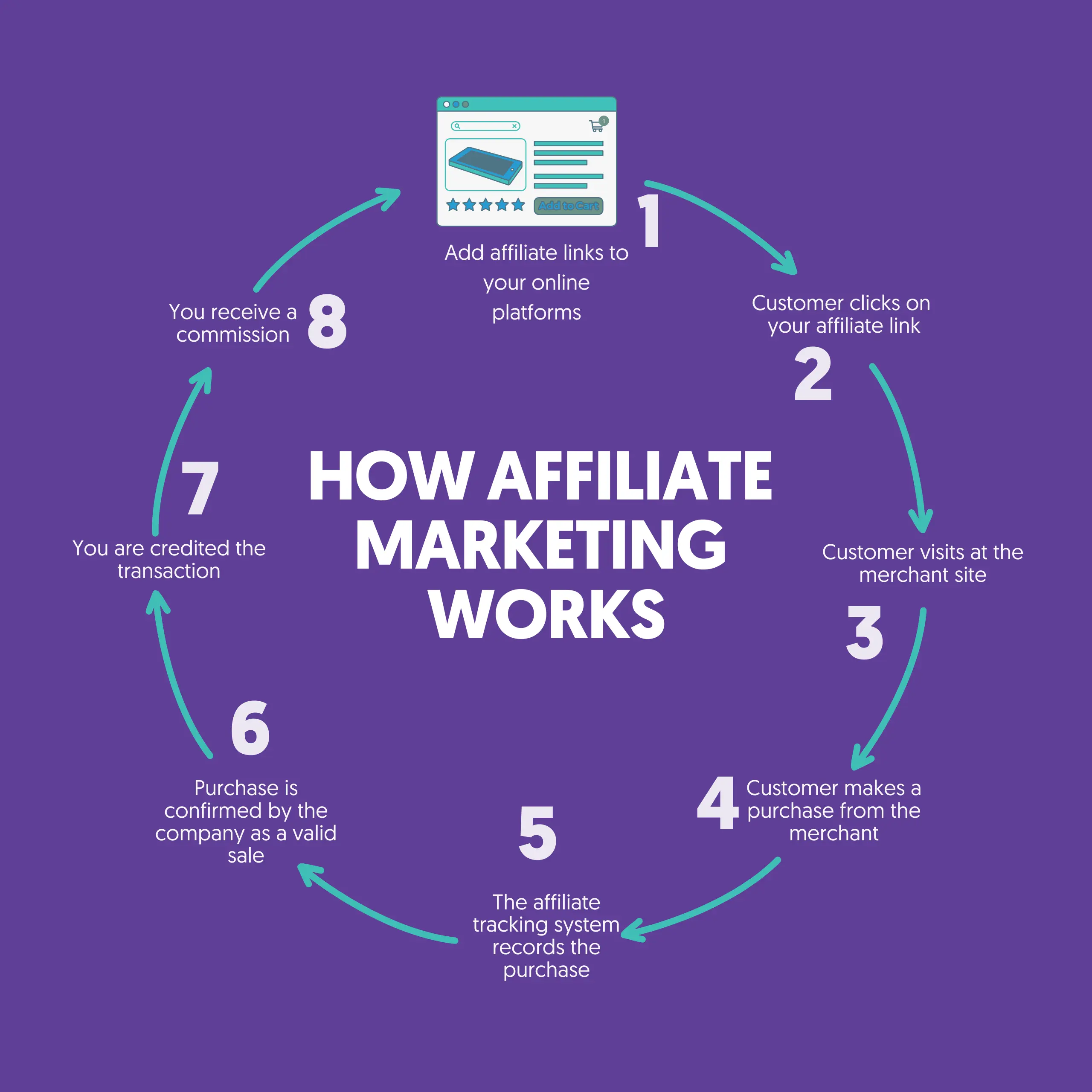
The first way is to promote other products on your website and social channels and earn a commission for each sale. The diagram above describes this in detail.
The second way is to set up your own affiliate program and pay other creators commissions for promoting and selling your products or services.
To learn affiliate marketing, you have to go through several steps. The most important are:
- Understand how affiliate marketing works
- Join affiliate marketing networks
- Find products to promote
- Learn what type of content works for affiliate marketing
- Learn how to write great product reviews
- Understand Google's rules regarding affiliate links
When you start with affiliate marketing, you'll soon realize that success depends on how well other marketing channels (SEO, content marketing, social media marketing) perform. So, learning digital marketing will also help you excel as an affiliate marketer.
Video Marketing
Video is one of the fastest-growing content types online. From YouTube to TikTok, people prefer watching over reading, and marketers are taking advantage of this.
Video marketing might be a good path if you’re comfortable on camera or interested in video editing. You’ll learn how to plan, shoot, and edit videos that educate, entertain, or sell. You’ll also discover how to use platforms like YouTube for SEO and run paid video campaigns that boost visibility.
Video marketing combines creativity with strategy. With video content performing better on social media and in search, this skill set can open many doors.
Step 4: Gain Practical Experience
Once you reach this stage, you probably learned the theory, explored your specialization, and possibly even earned a certification. But here is the thing: the only way to succeed as a digital marketer is to practice, practice, practice.
Work On Your Own Properties
The easiest way to begin is by creating your own projects. These could be simple blogs, personal websites, niche Instagram accounts, or YouTube channels.
Pick a niche you’re genuinely interested in, and treat it like your first client. Use it to test SEO strategies, write optimized content, run social media campaigns, or even try a small paid ad with a limited budget.
Apply For Internships
Another excellent way to gain experience is through internships. In an internship, you can work on real projects, follow structured processes, and learn directly from more experienced professionals.
Start Freelancing
Digital Marketing freelancing is an excellent option if internships aren’t available or you prefer more flexibility. You can start by offering your services to local businesses, non-profits, or entrepreneurs who need help with their online presence.
Build a Digital Marketing Portfolio
As you complete personal projects, freelance gigs, or internships, start documenting your work. Your portfolio doesn’t have to be fancy, but it should clearly show what the project was about and what you have achieved.
Step 5: Stay Updated and Network
Digital marketing is a fast-moving industry, and what worked last year, or even last month, might not work today. To stay relevant and grow your career, you must commit to continuous learning and connect with others in the field.
Start by following reputable digital marketing blogs and thought leaders who regularly share practical tips and updates. This helps you stay on top of trends, tools, and algorithm changes without feeling overwhelmed.
Equally important is building relationships with other marketers. Attend webinars, join online communities, or go to industry events. You don’t need to be an expert to network. A single conversation can lead to mentorship, job opportunities, or new ideas you wouldn’t have discovered alone.
Step 6: Learn to Use Digital Marketing Tools and AI
To succeed in digital marketing, you must know how to use the right tools. They help you save time, work smarter, and measure what’s working. AI is also becoming a powerful part of the marketer’s toolkit, boosting speed and creativity across tasks.
Start by getting comfortable with essential tools like Google Search Console, Google Analytics, and Looker Studio. These will help you understand how people find your site, what they do on it, and how to report on performance.
If you’re focusing on SEO or content, tools like Semrush and Ahrefs are must-haves for keyword research, competitor analysis, and content planning.
AI tools can make your workflow even faster. Use AI to brainstorm ideas, write copy, or improve your SEO. Tools like ChatGPT, Gemini, and built-in AI features in platforms like Google Ads can help, but remember, your human input still matters most.
Online Marketing Learning Tips
I’m sure you’ve realized by now that learning digital marketing is not easy.
Learning how each technique works individually and how to combine them for maximum results requires extensive reading and hours of practice. On average, it takes beginners 3-5 months to learn digital marketing.
The good news is that you can use the resources above to learn digital marketing at home and for Free. All you need is a willingness to learn and a lot of patience.
To make the process easier for you, follow the tips below:
- Start with SEO. Many of the concepts used by PPC, content marketing, and social media marketing are based on SEO principles. Building your SEO skills first will make it easier to learn the rest.
- Practice, Practice, Practice. Internet marketing is not a theoretical concept, but it’s mainly practical. Once you understand the theory behind a strategy, try to execute it in practice. Monitor the results, optimize your campaigns, and learn from your mistakes.
- Get Certified. As you progress through your learning, try to get certified. It’s a great way to showcase your expertise.
- Work with experienced Digital Marketers. Aim to work under the supervision of experienced digital marketers. They can make the transition from theory to practice easier, and you can learn a few tips and tricks not written in any books or courses.
- Start your own digital marketing blog. Having your own marketing blog will help you practice what you have learned and prove your expertise. Also, when you start writing about digital marketing, you can assess how well you know a topic or not.
- Never stop learning. Digital marketing is an industry that constantly changes, and learning never stops. As a digital marketing professional, it's your job to stay in sync with the latest developments and keep your clients informed.
